A Conversation with Bruce Duffie
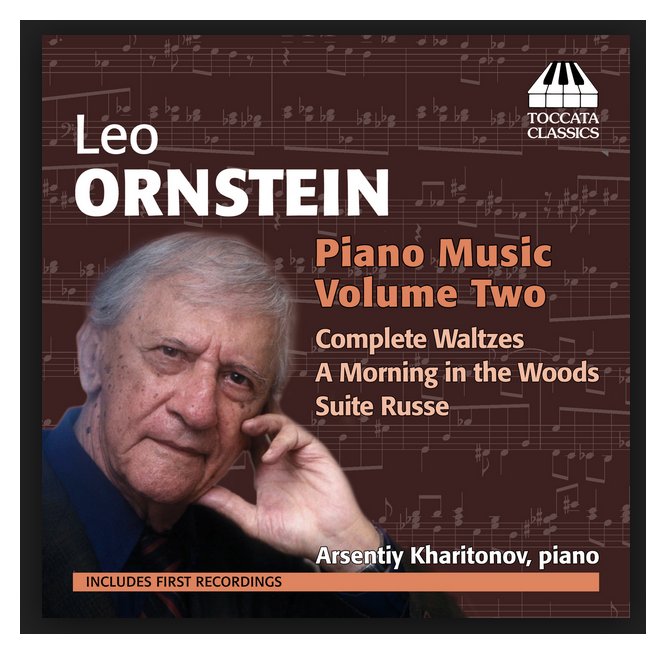

|
Leo
Ornstein, 108, Pianist And Avant-Garde Composer
By ANNE MIDGETTE Published: March 5, 2002 in The New York Times [Text only; photo from another source] Leo Ornstein, a Russian-born composer and pianist who in the early 20th century was a leading figure of the American avant-garde, died on Feb. 24 in Green Bay, Wis. He was either 108 or 109. 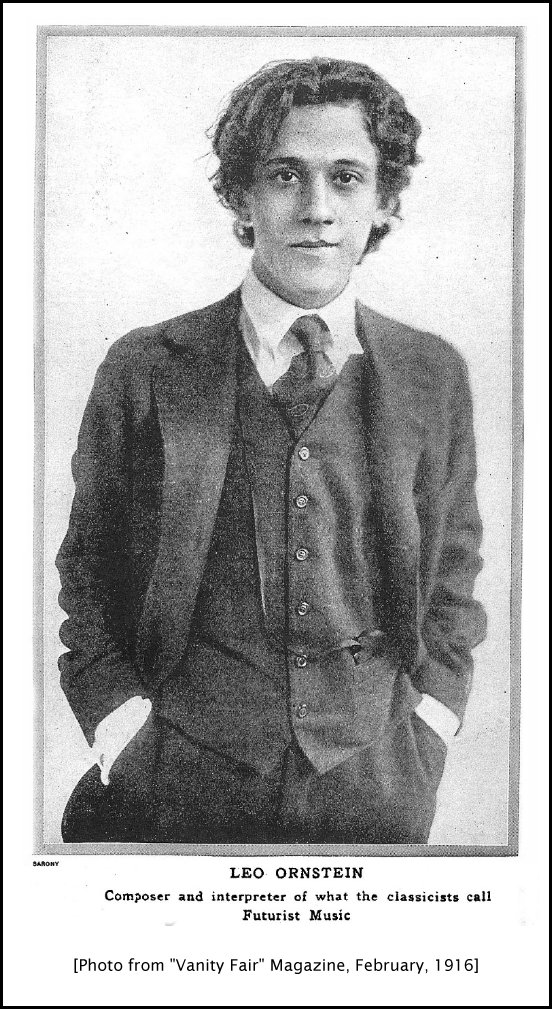 Viewed as a radical composer, Mr. Ornstein was ranked
with Stravinsky and Schoenberg in the 1920's and with Varèse and
Antheil in the 1940's, first as an innovator and ultimately as a
maverick. His early works made use of tone clusters, polyrhythms and
other new techniques before they were widely known. Viewed as a radical composer, Mr. Ornstein was ranked
with Stravinsky and Schoenberg in the 1920's and with Varèse and
Antheil in the 1940's, first as an innovator and ultimately as a
maverick. His early works made use of tone clusters, polyrhythms and
other new techniques before they were widely known.Audiences, predictably, were divided between horror and adulation. In 1918 the critic James Huneker called him ''the only true-blue, genuine Futurist composer alive.'' At the same time, The London Observer described the ''insufferable hideousness'' of his ''so-called music.'' Mr. Ornstein first came to fame as a piano virtuoso, performing his own works along with more conventional fare to packed houses. In 1918 when he was in his 20's, The New York Times described an audience for a matinee at Aeolian Hall clinging ''to walls, to organ pipes, pedal-base, stairs or any niche offering a view.'' The same year a biography was published, ''Leo Ornstein: The Man, His Ideas, His Work'' by Frederick H. Martens. It described the pianist, among other things, as ''an evil musical genius, wandering in a weird No-Man's Land haunted with tortuous sound.'' But in 1933 Mr. Ornstein, who disliked performing, retired from the stage, and after the St. Louis Symphony gave the world premiere of his ''Nocturne and Dance of Fate'' in 1937 he vanished into near-obscurity. ''What of Leo Ornstein, bright particular star of American composition a quarter of a century ago?'' wrote Olin Downes in The New York Times in 1945. ''We recently asked three of the composers of the rising generation about him. Two of them did not know his name. Twenty-five years ago his name was on the lips of every informed concertgoer.'' Mr. Ornstein, evidently unperturbed, kept on composing. In the 1970's there was a revival of interest in his work, and he was living in a mobile home in Texas, happily composing. His final work, the Eighth Piano Sonata, was composed in 1990, when he was in his late 90's. Leo Ornstein was born in December of either 1892 or 1893, said his son, Severo. The son of a cantor, he began studying piano at 3, and before he was 10 he had entered the conservatory of St. Petersburg, where he studied with Glazunov. In 1907 his family fled the growing anti-Semitism in pre-revolutionary Russia and settled in New York, where he studied at the Institute for Musical Arts (now the Juilliard School) and made his debut in 1911. On Dec. 11, 1918, he married Pauline C. Mallet-Prevost, who also studied at the institute. The unusual union between an immigrant from the Lower East Side and a Park Avenue debutante lasted for 67 years, until her death in 1985. In 1935 after his retirement from the stage, the Ornsteins founded the Ornstein School of Music in Philadelphia, which they ran successfully until it was sold in 1958. In addition to his son, of Woodside, Calif., he is survived by his daughter, Edith Valentine, of De Pere, Wis., five grandchildren, and four great-grandchildren. On March 26 Marc-André Hamelin, who has recorded Mr. Ornstein's work, will perform several Ornstein pieces at the Miller Theater. The event has been designated a memorial to the composer. ''Fame never had much meaning or appeal to me,'' Mr. Ornstein told Harold C. Schonberg of The Times in 1976. ''It was not worth it. If my music has any value, it will be picked up and played. If it has no value, it deserves its neglect.'' |
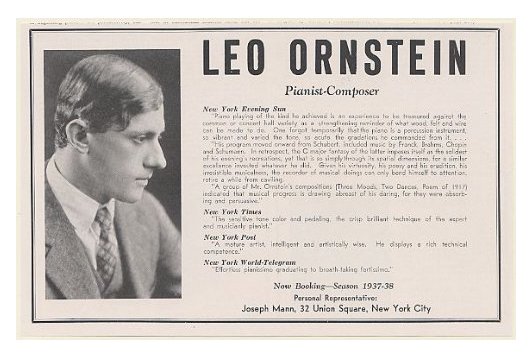 BD: You did a lot of
performing of your own music.
BD: You did a lot of
performing of your own music. 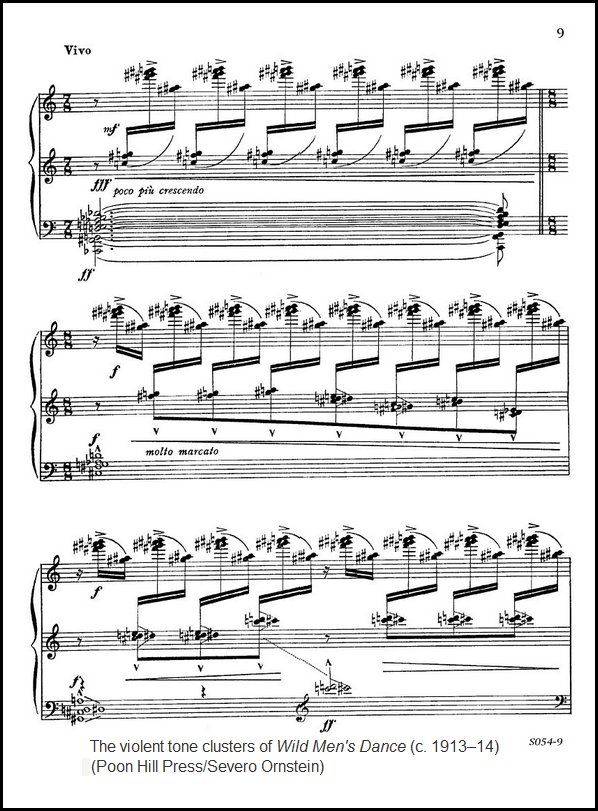 LO: I must say that
probably, on the whole, the
music must be in control of me, because just as I referred a moment
ago, since we do not understand about the origins of ideas, I have to
assume that to some extent what I hear is really what controls
me. I don’t know how to make a
safe kind of a statement. I just sit there with a paper
in front of me, and I might be able to purely exercise skill that I
have just learned, and yet behind the
rhetoric there's nothing very important being said, and so I can’t make
it. If something comes into my head, I have to decide whether
that is an important statement. Then I put it down, and I can
only hope against hope that the listener will enjoy it, too. I've
been sort of caught between two different styles.
I've been tremendously sensationalized as a young man by
writing what I suppose in those days probably appeared very,
very eccentric, and very experimental music.
LO: I must say that
probably, on the whole, the
music must be in control of me, because just as I referred a moment
ago, since we do not understand about the origins of ideas, I have to
assume that to some extent what I hear is really what controls
me. I don’t know how to make a
safe kind of a statement. I just sit there with a paper
in front of me, and I might be able to purely exercise skill that I
have just learned, and yet behind the
rhetoric there's nothing very important being said, and so I can’t make
it. If something comes into my head, I have to decide whether
that is an important statement. Then I put it down, and I can
only hope against hope that the listener will enjoy it, too. I've
been sort of caught between two different styles.
I've been tremendously sensationalized as a young man by
writing what I suppose in those days probably appeared very,
very eccentric, and very experimental music.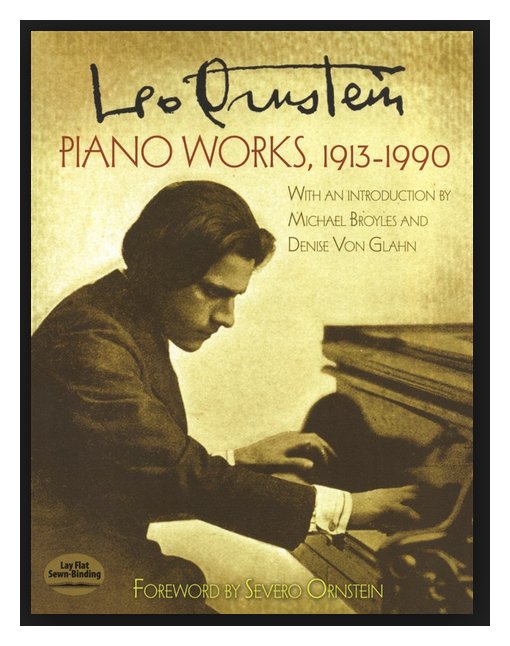 BD: Are they all
different sides
of your personality?
BD: Are they all
different sides
of your personality?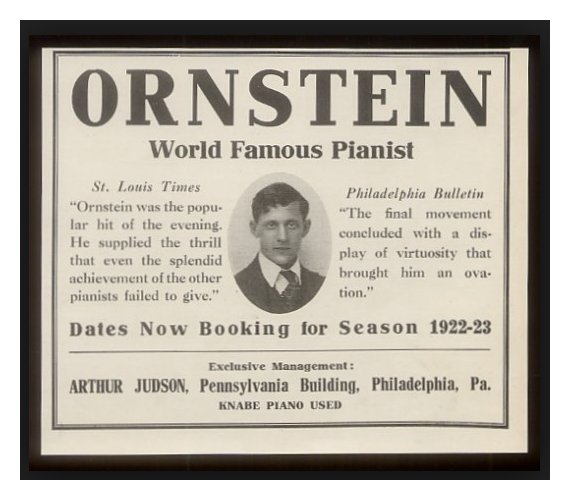 BD: I want to ask
you a bit about
teaching. You taught for a number of years and then formed your
own music school?
BD: I want to ask
you a bit about
teaching. You taught for a number of years and then formed your
own music school?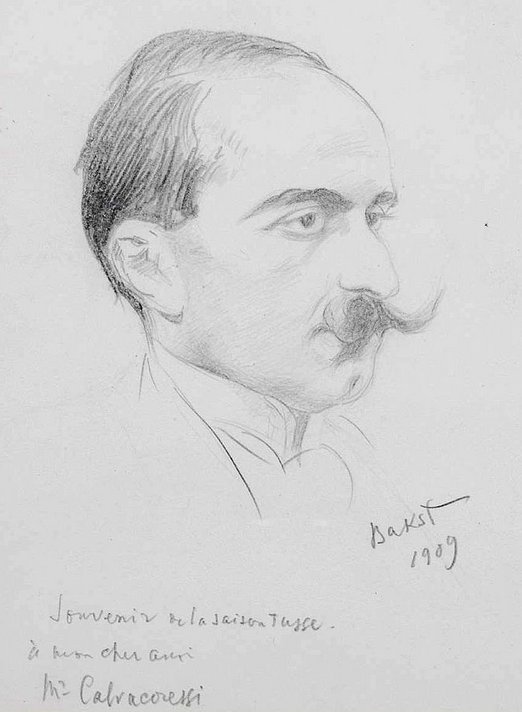 Michel-Dimitri Calvocoressi (2 October 1877, Marseille, France – 1 February 1944, London, England) was a multilingual music writer and critic who promoted musicians such as Franz Liszt and Modest Mussorgsky. Calvocoressi was born in France of Greek parents. At first, he studied law at the Lycée Janson de Sailly, and then studied music at the Conservatoire de Paris with Xavier Leroux. He became friends with Maurice Ravel. As a talented polyglot, Calvocoressi began a career in 1902 as a music critic and correspondent for several English, American, German and Russian periodicals. He also translated song texts, opera librettos and books from Russian and Hungarian into French and English. His subject of his first book was Liszt, but he was a strong proponent of Mussorgsky and other Russian musicians. Calvocoressi lectured at the Ecole des Hautes Etudes Sociales from 1905 to 1914, teaching about contemporary music. At the onset of World War I, the Greek Calvocoressi found himself unable to serve the French cause. He moved to London and served as a cryptographer. He spent the rest of his life in England, was naturalized, married an English citizen, and wrote the remainder of his books in English. Calvocoressi was a member of the Apaches music society. Calvocoressi's legacy as a music critic and translator was his advocacy for Russian music. He wrote three books on Modest Mussorgsky. He was the French advisor for Sergei Diaghilev as Diaghilev was introducing Russian arts to the French |
© 1987 Bruce Duffie
This conversation was recorded on the telephone on July 18,
1987. Portions were broadcast on WNIB later that
year,
and again in 1992 and 1997; on WNUR twice in 2011, and on Contemporary
Classical Internet Radio also in2011.
A copy of the unedited audio was placed in the Archive of Contemporary Music at Northwestern University. This transcription
was made in 2015, and posted on this
website
at that time.
To see a full list (with links) of interviews which have been transcribed and posted on this website, click here.
Award - winning broadcaster Bruce Duffie was with WNIB, Classical 97 in Chicago from 1975 until its final moment as a classical station in February of 2001. His interviews have also appeared in various magazines and journals since 1980, and he now continues his broadcast series on WNUR-FM, as well as on Contemporary Classical Internet Radio.
You are invited to visit his website for more information about his work, including selected transcripts of other interviews, plus a full list of his guests. He would also like to call your attention to the photos and information about his grandfather, who was a pioneer in the automotive field more than a century ago. You may also send him E-Mail with comments, questions and suggestions.